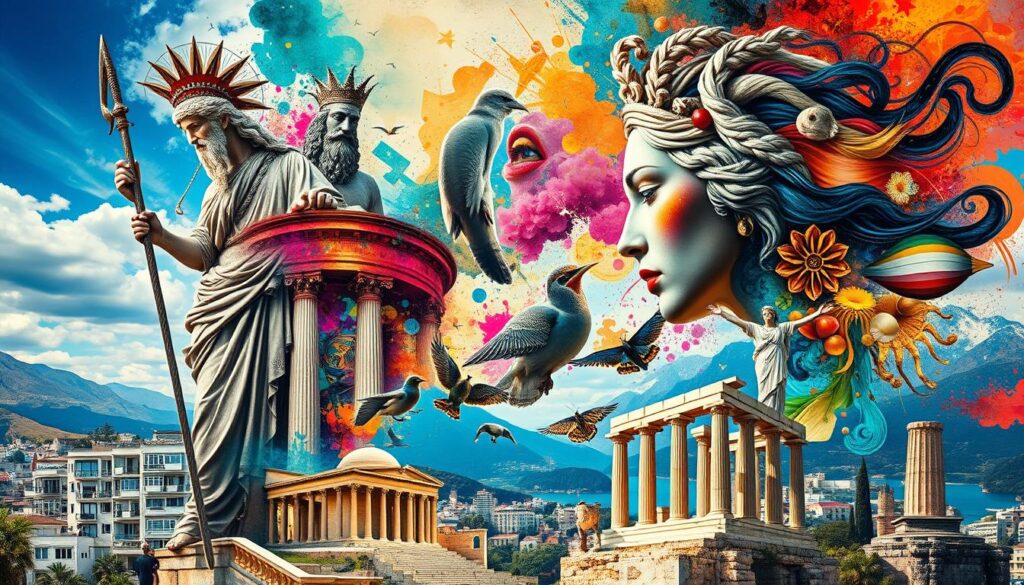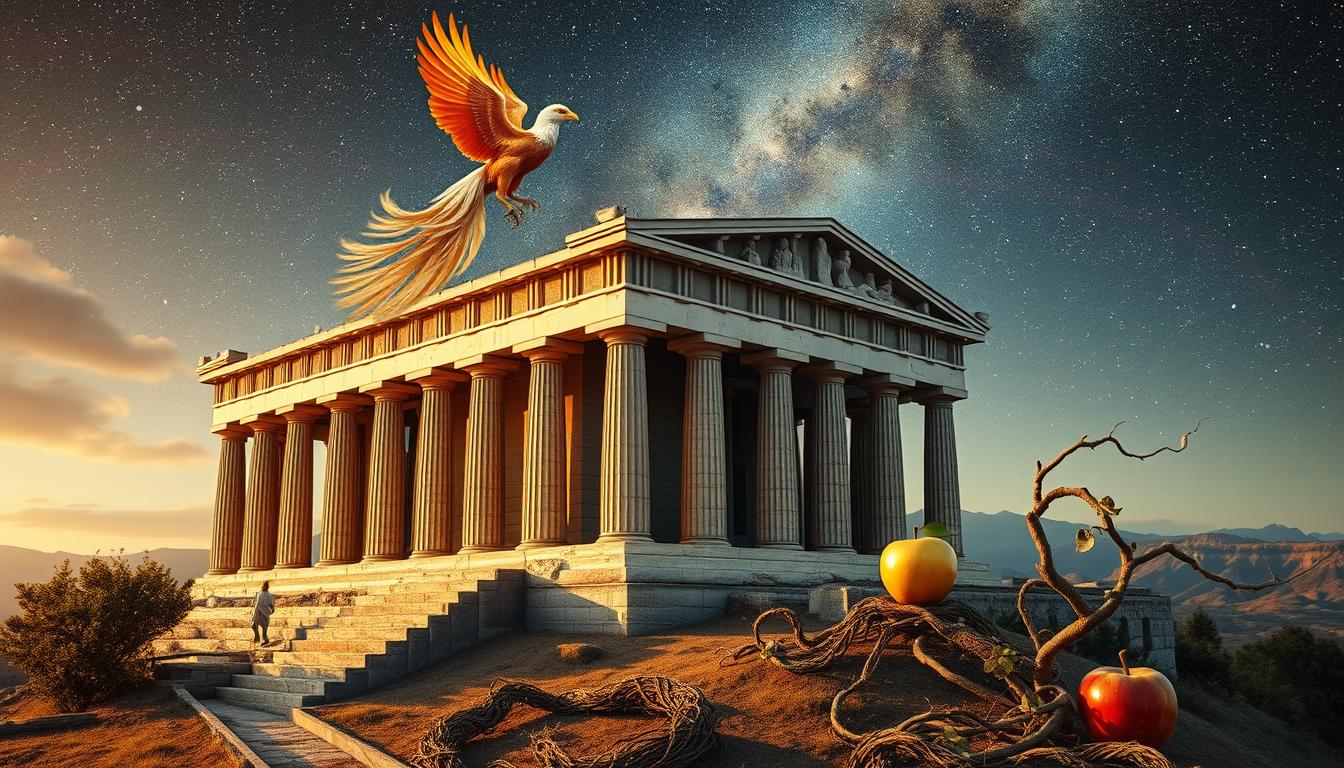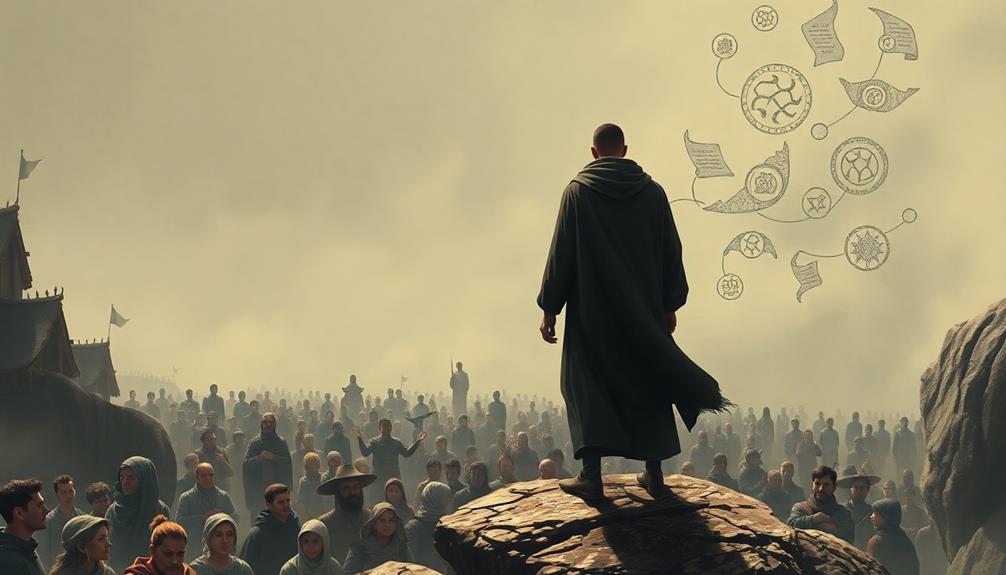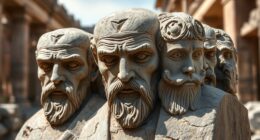Have you ever felt lost, facing too many choices? We all have moments that shake our views. In these times, we question our desires and place in the world. Greek myths are like mirrors, showing us life’s many faces. They tell stories of struggle, victory, and fear. Rooted in ancient Greece, these tales share deep truths about us.
Exploring ten specific myths can change how you see things. They inspire you to accept life’s twists and turns.
Key Takeaways
- Greek myths offer insights into human nature and the human condition.
- Ancient Greece’s mythology informs modern perspectives on morality and destiny.
- Evolving narratives about gods and mortals highlight the theme of transformation.
- Many stories from Greek mythology reveal timeless lessons applicable to modern life.
- Understanding these myths can reshape your appreciation of art and culture.
Introduction to Greek Mythology and Its Impact
Greek mythology is a fascinating tapestry woven from ancient stories. It captures our modern culture’s imagination. Legends passed down through oral traditions explained natural events and social customs.
The poet Homer, in the 8th century BC, brought these myths to life. He did this in epic works such as The Iliad and The Odyssey. These stories offer deep insights into human struggles and the will of the gods.
Around 700 BC, Hesiod introduced Theogony, the first written record of the gods’ origins. This laid the foundation for the Greek mythological universe. Since then, writers like Aeschylus, Sophocles, and Euripides have brought these myths to life on stage. Their plays deeply enriched 5th-century theater.
These myths go beyond stories, influencing brands like Nike and Amazon. Symbols from the 12 Olympian gods, such as Zeus and Aphrodite, permeate our culture. They shape how we see the world around us.
Heroes like Heracles and mythical creatures like Pegasus add to mythology’s rich story. They show the myths’ power to captivate. Discoveries about ancient civilizations like the Mycenaeans and Minoans give us insight into these stories. They reveal how myths influenced life from 1600 BCE.
Greek mythology’s legacy shines in literature, art, and media today. Its stories have flowed through different artistic periods, standing the test of time. They keep fascinating us, showing the deep, timeless connection we have to these ancient tales.
The Role of Mythology in Understanding the World
Mythology is key in shaping how we see the world and life. It gives us a collection of stories that guide our understanding of complex matters. These stories are not just for fun; they teach important life lessons and outline society’s values. They reflect our experiences, showing our fears, victories, and big questions about life.
Mythology’s narrative power is significant. For example, stories from ancient Greece often highlight universal themes like rebirth. These themes are similar to those in the stories of Jesus, Heracles, and Dionysos. Such similarities show that different cultures share common human experiences. This shows the lasting impact of myths on our lives and storytelling.
Another interesting point is how myths help us remember things better. Research shows that you’re more likely to recall something if it’s part of a well-structured story. Myths make learning about life’s truths and morality more fascinating. So, mythology’s role is more than just entertaining; it shapes our identities and how we view the world.
Think about how these timeless stories influence your view of yourself and society. Myths encourage us to look within and offer a way to understand our experiences. They are not just old tales but crucial cultural teachings connected to who we are today.

| Aspect | Description |
|---|---|
| Framework for Life | Myths help interpret life’s complexities. |
| Moral Lessons | Convey values that shape societies. |
| Narrative Significance | Offer insights into human experiences. |
| Universal Themes | Share similarities across cultures. |
| Memory Retention | Structured stories enhance recall. |
Exploring the Deities of Olympus
The Greek gods live on Mount Olympus, and they show us the depth of human feelings and nature. Each god stands for different life aspects. Their stories mirror what the ancient Greeks valued.
Zeus, the top god, is known for his incredible power and control. His dealings with Hera, his wife and the marriage goddess, mix love and betrayal. Poseidon rules the seas and storms, showing how nature can surprise us.
Athena is celebrated for her smarts and battle strategies. Her story teaches us the value of brainpower and bravery. Together, these gods’ lives show the tight and tangled links in mythology.
Looking into their stories makes Greek myths come alive. Plus, it teaches us lessons that echo through time. These gods’ tales have shaped how people see the world, affecting art, writing, and what we think is right.

The Concept of Hubris in Greek Myths
Hubris means having too much pride. It is a key idea in Greek myths. Many stories show how being overly proud can lead to big troubles. People who challenge the gods or think too highly of themselves often face harsh outcomes. Learning from these stories helps us understand their value and teaches us important life lessons.
Real-Life Lessons from Hubris
Take Icarus and Narcissus, for example. Their stories teach us important truths about pride. Icarus flew too near the sun, which teaches us respecting nature’s limits is critical. Narcissus fell in love with his reflection, showing us vanity leads to emptiness. Their stories tell us that being too proud can cause our downfall. They remind us to be humble every day.
The Downfall of Proud Mortals
In Greek tragedies, characters like Arachne and Odysseus face severe penalties for their hubris. Arachne challenged Athena in weaving and suffered greatly for her arrogance. Odysseus’ story is about the chaos that follows when we act too boldly. These tales emphasize respecting powers beyond ourselves. They warn us to think about what our actions might lead to.

| Character | Hubris Trait | Consequences |
|---|---|---|
| Icarus | Excessive ambition | Fell to his demise |
| Narcissus | Vanity and self-love | Trapped in his reflection |
| Arachne | Defiance against the gods | Transformed into a spider |
| Odysseus | Pride in cunning | Long, tumultuous journey |
10 Greek Myths That Will Change How You See the World
Greek mythology is full of stories that change how we see life and right and wrong. Ancient tales tell of deep human truths. They teach lessons that still matter today. Here are ten myths that can really make you think and see things differently.

The story of Prometheus is about what happens when you defy the gods. He stole fire from Olympus and got punished. For thirty years, he was chained—a lesson in ambition and respecting power. This myth makes us think about progress and innovation today.
Pandora’s box shows how curiosity can have unexpected bad effects. It’s a cautionary tale for today’s world. Issues with technology and the environment remind us of Pandora’s story.
The abduction of Persephone reflects on the changing seasons and life and death. It invites us to see our own lives in nature’s cycle. This story especially connects with today’s concern for the environment.
Sisyphus’s story is about struggling against impossible odds. It poses questions about keeping going and finding meaning. This tale encourages us to see value in everyday tasks.
These myths hold important lessons. They make us think about our lives, society, and how we grow.
| Myth | Key Lesson | Modern Relevance |
|---|---|---|
| Prometheus | Consequences of defiance | Innovation vs. authority |
| Pandora’s Box | Unintended consequences | Technology’s impact on society |
| Persephone | Cycles of life and death | Ecological awareness |
| Sisyphus | Finding purpose in struggle | Work-life balance |
| Athens Naming Ceremony | Value of wisdom | Importance of thoughtful choices |
| Theseus and the Minotaur | Strategic thinking | Problem-solving in modern life |
| Icarus | Limitations of ambition | Technological advancement |
| Hercules’s Labors | Collective efforts | Environmental restoration |
| Orpheus | Preservation of memories | Digital memorialization |
| The Siren’s Call | Impact of allure | Consumer behavior |
Greek myths aren’t just entertaining. They also make us think deeply. They help us look at our lives and grow. Consider how these old stories might change how you see your own path.
Creation Myths: Understanding Existence Through Greek Tales
Creation myths are deep stories that shine a light on our quest to know how the universe began. Greek tales are filled with gods and natural forces, showing life’s many facets. They help us tackle big questions about why we are here.
Variations in Creation Stories
Greek myths often start with Chaos, a mess from which the world and gods emerge. Different gods, like Gaia and Uranus, have their unique roles in these stories. Here’s a summary of some key Greek myths:
| Myth | Main Characters | Core Theme |
|---|---|---|
| Theogony | Zeus, Cronus, Gaea | Ascendancy of the Olympians |
| Chaos to Order | Chaos, Gaea, Uranus | Transition from disorder to structured existence |
| Golden Age | Various gods | Era of harmony and perfection |
| Inequalities of Ages | Zeus, divine race | Decline of humanity through four ages |
The Connection to Modern Cosmology
Seeing creation myths with a modern view shows how they align with scientific theories on the universe. These ancient stories relate to today’s questions about existence. They remind us that our search to understand where we come from is ongoing. Studying myths can change how we see our world and its origins.

Persephone: The Myth of Seasons and Cycles
The story of Persephone tells us about life, death, and season changes. It shows how myth captures life’s essence. Her tale goes back to 340 BCE. It symbolizes balance in life.
Persephone’s story is about changes in seasons and human experiences like loss and starting anew.
The Duality of Life and Death
Persephone shows the duality in us all, blending life and death. Every year, she is taken by Hades to the underworld for six months. This time is autumn and winter.
Then, she spends six months on earth with her mother, Demeter. This part is about renewal and growth in spring and summer.
Her story explains the seasons. When Persephone goes down, it gets colder. Her return brings the warm spring. Eating four pomegranate seeds ties her to the Underworld for four months. This cycle reflects life and death’s balance.
The story gets complex with gods like Demeter, Hades, and Zeus. It shows how myths mimic nature’s changes. They reflect culture too.
Persephone’s journey talks about life’s big changes. It reminds us of the need for balance in nature and our lives.
| Aspect | Description |
|---|---|
| Mythological Origin | Dating back to around 340 BCE, the myth illustrates seasonal cycles. |
| Key Figures | Persephone, Demeter, Hades, Zeus, Helios |
| Seasonal Representation | Six months in the Underworld symbolize winter; six months above ground signify summer. |
| Pomegranate Seeds | Her consumption ties her to Hades for part of the year. |
| Cultural Impact | Persephone’s story is central to the Eleusinian Mysteries, highlighting connections to agricultural practices. |

Encounters with Fate: The stories of Sisyphus and Prometheus
The tales of Sisyphus and Prometheus show a timeless fight against fate. Sisyphus was forced to roll a huge rock up a hill, only to watch it roll back down. This endless task was his punishment by the gods. It shows us how people keep going even when it seems pointless. His story deeply talks about the human spirit, showing us meaning in even hopeless situations.
Prometheus, on the other hand, is about rebellion. He took fire from the gods and gave it to humans, pushing forward human progress. But he paid a heavy price, as Zeus made him suffer endlessly for it. His story looks into the thirst for knowledge and fighting against control. Prometheus teaches us that seeking understanding and growth can have big consequences, similar to Sisyphus’s story.

These myths capture the depth of human life. Sisyphus’s never-ending work shows the essence of our efforts, while Prometheus giving fire shows the power of facing fate. They both show the strength to carry on, either by fighting back or enduring. Their stories inspire us to think about our fights and the wish to be free in a world full of unbeatable forces.
| Myth | Core Theme | Symbolism | Struggle Against Fate |
|---|---|---|---|
| Sisyphus | Futility and Perseverance | Endless cycle | Defying destiny with determination |
| Prometheus | Rebellion and Knowledge | Fire and enlightenment | Challenging divine authority |
The Influence of Greek Mythology on Western Culture
Greek mythology has a big impact on modern Western culture. It’s more than old stories; it shapes our understanding of stories, art, and life. These myths are not just about gods, but also about human actions, moral lessons, and big life questions.
Works like the Iliad and the Odyssey, by Homer, show how important these stories are. They talk about fate, honor, and gods stepping into human lives. Another work, Theogony by Hesiod, tells us where the gods come from. These tales were first told out loud and then written down, changing a little each time.
Greek plays by Aeschylus, Sophocles, and Euripides are timeless. They show the fight against fate, a fight that we still understand today. Many myths connect closely with what it means to be human, keeping them important to us.
| Aspect | Greek Mythology Influence | Modern Relevance |
|---|---|---|
| Literature | Foundation for narratives | Inspires modern authors and stories |
| Art | Rich subject matter | Influences paintings and sculptures |
| Language | Vocabulary derived from myths | Shapes idioms and everyday speech |
| Psychology | Concepts like hubris and fate | Applied in therapeutic practices |
Greek mythology is also in today’s social structures and common values. It helps us talk about right and wrong, destiny, and being human. It gives us a way to understand and create stories in culture today. So, Greek myths still help shape our ideas and creativity.

Lessons on Human Nature from Greek Myths
Greek myths delve into deep human emotions like love and jealousy. They use timeless stories to shine a light on our actions. By looking into these tales, we learn valuable lessons that echo in today’s world.
The story of Narcissus warns us about the harm of loving oneself too much. It shows us the dark side of vanity. Freud also explored this theme, highlighting its impact on humans. On the other hand, the tale of Icarus teaches us about the dangers of being too proud and taking unreasonable risks.
The Sisyphus myth tells us about the downsides of too much pride and deceit. It reminds us to think about the repercussions of our goals. This story is similar to modern teachings about being morally responsible and aware of ourselves.
“In myths, we find profound reflections on our virtues and vices, serving as mirrors to our own lives.”
The Oedipus myth stresses the significance of embracing our destinies. It advises us against trying to go against what’s meant to be. This lesson helps us grasp the depth of human morals and life’s complexities.
| Myth | Lesson on Human Nature |
|---|---|
| Narcissus | Beware of excessive self-love and vanity. |
| Icarus | Understand the peril of hubris and recklessness. |
| Sisyphus | Recognize the consequences of pride and manipulation. |
| Oedipus | Accept fate and understand the risks of defying destiny. |

These ancient stories do more than entertain. They challenge us to think more deeply about who we are. Through them, we can better navigate the moral challenges we face in life.
Connecting Greek Myths with Modern Life
Greek myths are still important today. They teach us life lessons relevant to our lives and society. Looking at King Midas, we talk about how too much greed can lead to problems. This makes us think about people today who fall because they want too much wealth.
The story of Arachne, the weaver, connects well to biology lessons about spiders. These ancient stories help us understand nature better. Echo and Narcissus’s story is used in psychology. It explains the background of Echolalia and Narcissistic Personality Disorder. It shows how old myths can explain modern psychological issues.
The story of Sisyphus brought the idea of “Sisyphean” tasks to our language. These are jobs that seem never to end and are pointless. This idea is very relevant to many struggles people face every day. In English classes, the sad love story of Pyramus and Thisbe is compared to “Romeo and Juliet.” It opens discussions on love, sacrifice, and the problems with forbidden love.
Greek myths about farming show how important wheat, grapes, and olives were. They remind us of nature’s role in our lives today. Lastly, the gods Dionysus and Hestia show values important both long ago and now. Dionysus stands for fun and community, while Hestia shows the importance of home and family.
| Myth | Modern Relevance | Relevant Subject |
|---|---|---|
| King Midas | Reflection on greed and downfall | English/Language Arts |
| Arachne | Introduction to biology and arachnids | Biology |
| Echo and Narcissus | Origins of Echolalia and narcissism | Psychology |
| Sisyphus | Concept of Sisyphean tasks | Philosophy or Sociology |
| Pyramus and Thisbe | Themes of love and tragedy | English/Language Arts |
| Dionysus | Influence of festivities and community | Cultural Studies |
| Hestia | The value of home and family | Social Studies |

Modern Interpretations of Greek Myths in Arts and Literature
Greek myths have always captivated people. They influence arts and literature even today. Many modern works re-imagine these old stories, connecting ancient myths with today’s themes.
In art, figures like Odilon Redon have revisited myths. Redon’s 1914 painting of Pandora is full of life, showing curiosity’s double-edged sword. Another example is Peter Paul Rubens. His Perseus Frees Andromeda depicts heroism in a dramatic scene.
Literature too is rich with Greek myth inspiration. It’s said that over 80% of famous literary works reflect these myths. These stories are timeless, discussing human nature, morality, and destiny.
Films and TV also draw from Greek myths. Shows like “Hercules: The Legendary Journeys” share these ancient tales with new fans. They entertain while also delivering meaningful messages.
About 50% of ads use mythological themes too. They grab attention by tapping into familiar stories. This method shows how myths still speak to us.
Greek myths impact modern culture in art, literature, and beyond. Artists and writers find fresh ways to tell these age-old legends. They show how these ancient stories matter to us now.

Conclusion
Greek myths have been around for thousands of years. They help us understand human nature and the world. Tales of gods like Zeus and constellations such as the “Great Bear” mix history, morality, and the cosmos.
Looking at constellations resembling lions or bulls shows our bond with the stars and Greek myths. Stories with Hera and Artemis help explain life’s mysteries. They guide us through our own journeys.
Stars like Deneb showcase the universe’s grandeur. They remind us we’re just a small part of something much larger.
Greek mythology’s true value lies in the life lessons they provide. Reflecting on these stories can empower you. They enrich your view, fostering a deeper love for life’s complex story.









